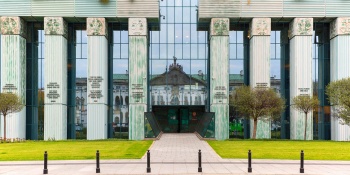Published: 22.02.2023

· Amendments to the Public Order Bill are under way in the British Parliament.
· It concerns so-called "safe access" zones around abortion clinics in the UK.
· Similar legislation is currently in effect in Northern Ireland, where areas are created within 150 meters of these facilities, where it is forbidden not only to protest against abortion, but even to pray quietly and talk about alternatives to abortion.
· Earlier, a UN committee declared the action of pro-life advocates "aggressive" and "discriminatory," and called for the introduction of legislation in Great Britain and Northern Ireland banning such actions.
· The Ordo Iuris Institute points out that the implementation of these amendments could consequently lead to the exclusion of pro-life advocates from public debate.
The case had its beginning on March 24, 2022, when the Northern Ireland Assembly passed the Abortion Services Act. Article 5(2) of that act criminalizes "taking action in the safe access area of abortion clinics with the direct or reckless intent to influence a protected person, directly or indirectly." "Protected" persons include clients of abortion clinics, those accompanying them and medical personnel.
The law does not give pro-life advocates expressing their views in the vicinity of hospitals any opportunity to invoke "legitimate justification" for their actions. Accordingly, the Attorney General of Northern Ireland has asked the Supreme Court of Great Britain to rule on whether the said provision exceeds the legislative competence of the Northern Ireland Assembly. This is because it involves a violation of the freedoms of conscience, religion, assembly and expression, which are guaranteed by the European Convention on Human Rights. The prosecutor pointed out to the court that the situation of pro-life activists is in practice less favorable than, for example, environmentalists blocking public roads. However, the Supreme Court ruled that the law's provision did not violate the rights mentioned.
The United Nations Committee on the Elimination of Discrimination against Women (CEDAW) also spoke on the issue. In its report, the body pointed to forms of "obstruction" of women's access to abortion in Northern Ireland. Behaviors such as pro-life advocates displaying posters with photos showing the effects of abortion, holding talks with women to change their decisions, or handing them pro-life leaflets were described as "aggressive" in the report. The CEDAW committee deemed the activists' activities "discrimination against women" and called for a law that would absolutely prohibit any activities around abortion clinics and affiliated facilities.
Parallel to the work in Northern Ireland, legislative activity was underway in the UK Parliament on an amendment to Article 9 of the Public Order Act. According to this act, even praying in thought in front of abortion clinics would be banned. Amendment 45 to the act seeks to prohibit, under penalty of a fine, any peaceful attempt to influence a woman who intends to have an abortion to change her mind. According to another amendment proposed in the House of Lords, it would be sanctioned to communicate abortion-related information in a manner that can be seen or heard by a person attempting to enter or leave abortion facilities and is reasonably likely to cause distress. The amendments are currently being considered by the House of Lords. They will then go to the House of Commons, and once approved, royal assent will be required.
- The next step could be to censor the public expression of pro-life views under the pretext of potentially influencing women seeking abortions. The planned amendment could lead to the exclusion of opponents of abortion from public discourse. It is therefore reasonable to conclude that where the law ceases to protect human life from the moment of conception, the remaining members of society will in short order successively lose their remaining freedoms - freedom of speech, conscience and assembly. Without these freedoms, which are the pillars of democracy, the state will lose its status as a democratic state under the rule of law," emphasized Magdalena Mickiewicz, coordinator of the Religious Freedom Center of the Ordo Iuris Institute.

• Amendments to the directive on the rights of victims of crime are currently under consideration in the European Parliament.

10.06.2025
According to the authors of the report published today, titled “Violations of the Principles of a Democratic State of Law and the Rule of Law by the Government Donald Tusk after December 13, 2023,” the authorities, under the leadership of Polish PM Donal

09.06.2025
Presidential elections, which have just taken place in Poland, were won by the candidate supported by the opposition. According to the law, the validity of the elections should be decided by the Extraordinary Review and Public Affairs Chamber of the Supreme Court. However, the government is questioning the competence of this chamber, which could be interpreted as an attempt to obstruct the transfer of power to the newly elected president.

The candidate supported last Sunday by all the Right for the second round of the Polish presidential election had promised that he would veto any law that liberalizes abortion. He won with 50.89% of the votes against the left-liberal candidate who had promised to ratify any law liberalizing abortion.